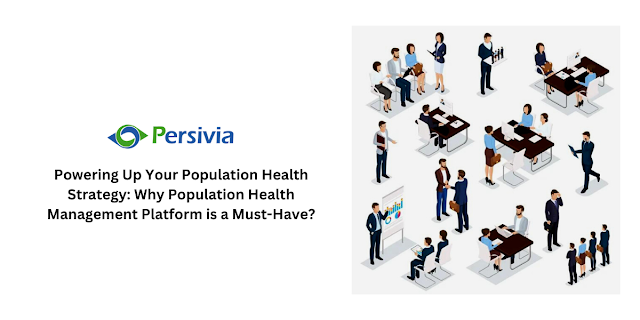Powering Up Your Population Health Strategy: Why Population Health Management Platform is a Must-Have?
Population Health Management is no longer a choice but a necessity when it comes to sustaining successful healthcare organizations. In today’s fast-paced and competitive healthcare environment, providers must have the right tools to maximize efficiency and patient outcomes. Pop Health has emerged as a strategy for addressing healthcare challenges at a broader level, and the Population Health Management Platform (PHMP) is the weapon of choice for healthcare providers looking to gain a competitive advantage. A comprehensive PHM Platform can be the key factor in achieving optimal care outcomes followed by financial success.
Population Health Management: A Strategy for Winning
Population health management is a strategy that focuses on improving the health outcomes of a specific population. This can include a variety of approaches, such as identifying high-risk patients, coordinating care across multiple providers, and promoting healthy lifestyles. The goal of PHM is to prevent chronic diseases and complications, reduce healthcare costs, and ultimately improve patient outcomes.
Population Health Management Platform: The Weapon of Choice for Healthcare Providers
PHMPs are critical tools for healthcare providers that are looking to improve their patient outcomes. These platforms allow providers to collect and analyze patient data, monitor patient health, and coordinate care more effectively. By using these platforms, providers can identify patients who are at risk of developing chronic diseases or complications, and proactively intervene to prevent them from worsening.
Benefits of Pop Health Management Platforms: Knocking Out the Competition
There are numerous benefits to using population health management platforms. These include:
• Enhanced Patient Outcomes: Pop health management platforms allow providers to identify high-risk patients and intervene early to prevent complications, reducing hospital readmissions and improving overall health outcomes.
• Enhanced Patient-Provider Coordination: With the ability to share patient data across multiple providers and care settings, pop health platforms can improve care coordination, reduce duplicative testing and treatments, and save time and resources.
• Alleviated Healthcare Costs: By proactively managing patient health and preventing complications, healthcare costs can be reduced over time, saving costs at both provider's and the patient’s end.
Conclusion
The data-driven pop health strategies are a must for healthcare organizations looking to improve outcomes and reduce costs. Population health management platform offers the efficiency, scalability, and flexibility needed to make this vision a reality. Investing in these platforms can create sustainable population health management strategies that are tailored to meet particular needs and goals.




Comments
Post a Comment